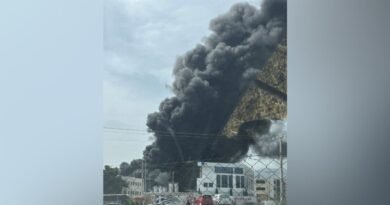The Impact of Oct. 7: A Year of Change in the Middle East
Israel and Iran have shown a greater willingness to take risks and engage in conflicts, but the Oct. 7, 2023 attack’s ultimate goal seems to have been foiled.
A year after the devastating attack on Israel on Oct. 7, 2023, the Middle East has undergone significant changes.
The Hamas group in Gaza has been severely weakened, with its control unlikely to be restored. Additionally, Israeli military operations are swiftly degrading Hezbollah in Lebanon. Despite Iran’s increased aggressiveness, Israel’s robust missile defense systems have thwarted its attempts.
Tensions remain high, indicating that the fighting is far from over.
Various regional players, such as the Houthi group in Yemen and Russian forces in Syria, could further destabilize the already turbulent Middle East.
Due to Iran’s support of terrorist groups and direct attacks on Israel, Brodsky believes that Israel no longer tolerates limited military actions and is more willing to confront threats directly.
Israel is now more willing to take risks in confronting the Iranian threat, as evidenced by recent ground assaults into Lebanon to address Hezbollah threats and retaliating against Iranian missile strikes despite U.S. calls for de-escalation.
Many in Israel see the increased risk-taking as necessary to counter Iran’s commitment to undermining and destroying Israel.
Jonathan Harounoff, international spokesperson for the Israeli Mission to the United Nations, emphasized that Iran’s support for terrorist groups like Hamas and Hezbollah proves a dedication to conflict with Israel above all else.
He stressed that Israel’s fight is against the radical regime in Tehran and its proxies, not the people of Iran or Lebanon.
Harounoff highlighted Israel’s defensive actions against threats to its people and territory and clarified its stance against the clerical leaders of Tehran, who also oppress their citizens.
Israel’s Strategic Approach
Despite the increased willingness for conflict, concerns about regional war and Israel’s vulnerability have not materialized.
Initial fears following the Oct. 7 attacks included the possibility of a multi-front war that Israel might struggle to handle, according to experts.
Even small attacks from Hezbollah could strain Israeli resources, diverting attention from Gaza.
U.S. defense officials shared these concerns about containing Lebanon’s threat and preventing Israel from being overextended.

An Israeli soldier moves on the top of a tank near the Israeli-Gaza border, as seen from southern Israel, on July 14, 2024. (Tsafrir Abayov/AP Photo)
Naveen Athrappully
However, Israel’s focused efforts on dealing with Hamas first have enabled preparations to tackle the Hezbollah threat more effectively.
Paul Crespo, president of the Center for American Defense Studies, praised Israel’s strategic approach in consecutively addressing Hamas and Hezbollah threats.
He highlighted the competence and power of the Israel Defense Forces (IDF), focusing on their strengths to counterbalance Israel’s smaller size.
Crespo raised the question of whether Israel would confront Iran directly or prioritize addressing Hezbollah in Lebanon before expanding their conflicts with Iranian proxies.
Geopolitical analyst Sam Kessler noted Israel’s success in disrupting Hamas and Hezbollah leadership but highlighted the complexity in managing expectations of allies like the U.S.
He pointed out that Israel’s decisions impact its military, diplomatic, and economic standing globally, affecting future power projection capabilities in potential conflicts.

Yemen’s Shiite Huthi rebels shout slogans during a gathering to mobilise more fighters to battlefronts to fight pro-government forces, on June 18, 2017, in the Yemeni capital Sanaa. Mohammed Huwais/AFP/Getty Images
Potential Risks
Despite Israel’s strategic approach, potential threats exist that could strain its resources and escalate conflicts among regional powers.
The Iran-backed Houthis in Yemen have disrupted shipping in the Red Sea and pose a growing threat to Israel. Limited Israeli airstrikes in Yemen may escalate if the Houthis enhance their targeting capabilities.
Russian influence in the region adds complexity, evident in Israeli strikes on Russian-made weapons in Lebanon and Syria. While Russia has not directly supplied Hezbollah with weapons, arms deals with Iran could indirectly fuel conflicts against Israel.
Persistence of Normalization
Despite these challenges, efforts towards normalization between Israel and its Arab neighbors persist.
The Trump-era Abraham Accords initiated genuine relations between Israel and its neighbors, which Brodsky believes were only momentarily delayed by the Oct. 7 attacks. The attacks revealed Iran and its proxies’ destabilizing influence to Arab states rather than turning them against Israel outright.
Saudi Arabia’s interest in normalizing relations with Israel represents a defeat for Iran’s regime, as the Oct. 7 attacks were aimed at obstructing normalization.
Although Israel suffered losses on Oct. 7, the goals of the terror attacks have been thwarted for now, keeping the pathway to normalization open.





